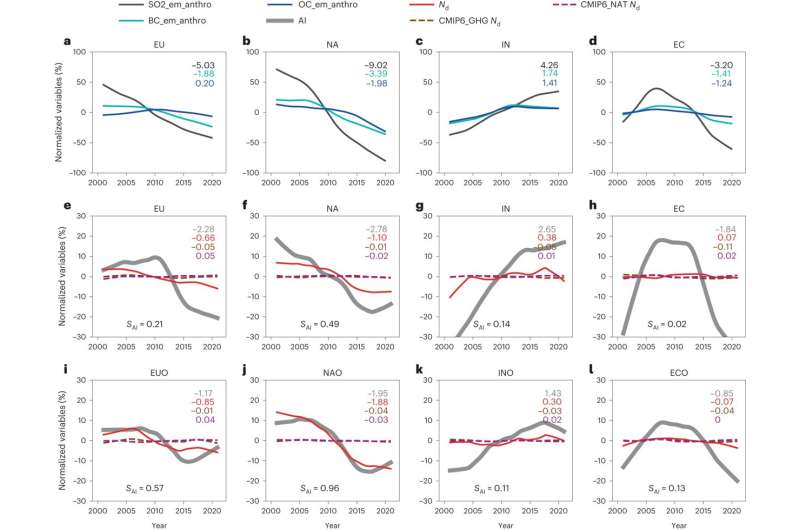This article has been reviewed according to Science X's editorial process and policies. Editors have highlighted the following attributes while ensuring the content's credibility:
fact-checked
peer-reviewed publication
trusted source
proofread
Study suggests additional warming of the Earth due to better air quality could occur later than previously thought

In a recent study, scientists at Leipzig University have revised previous assumptions about the influence of pollutant particles, known as aerosols, on global warming. Using satellite data, Dr. Hailing Jia and Professor Johannes Quaas have shown that the relationship between water droplets in clouds and aerosol concentration is more non-linear than previously thought.
Specifically, in heavily polluted regions, the additional warming of the Earth resulting from better air quality could occur much later than originally believed—perhaps as much as 20 or 30 years later than expected. The Leipzig study was recently published in the journal Nature Climate Change.
Concentrations of aerosols have fallen significantly since 2000. This is good news because aerosols are harmful to humans and the environment. At the same time, the cooling effect of these particles on the climate has also decreased: aerosols, in the form of pollutant particles such as fine dust or sulphuric acid, cool our climate by reflecting sunlight and increasing the reflectivity of clouds.
Study sheds light on complex interrelationships between aerosols and clouds
Until now, researchers assumed that the warming effect of fewer aerosols in the air would be felt immediately. The new study from Leipzig University shows that it is not that simple. "With our new non-linear method for calculating aerosol-cloud interactions, we were able to show that in highly polluted regions, the additional warming due to improvements in air quality occurs two to three decades later than previously assumed," says first author Dr. Hailing Jia, who works as a research assistant at the Leipzig Institute for Meteorology at Leipzig University.
"Our study underlines how complex the relationship between aerosols and clouds is, and how important it is to better understand these interactions in order to make future climate projections more reliable."
The study shows that more accurate modeling of these processes is needed. This will open up new ways to better understand the influence of air quality on climate. "The results of our study are also important for climate policy: when and how much aerosol reduction affects global warming needs to be studied in more detail in order to make informed decisions for the future," says Professor Johannes Quaas, a meteorologist at Leipzig University.
Estimates suggest that cloud-related warming due to stricter air quality standards will be felt in China from around 2025 and in India from 2050. "As we approach the 1.5°C Paris target, our findings underscore the urgency of reducing greenhouse gas emissions to avoid a sharp rise in temperature," says Quaas.
More information: Hailing Jia et al, Nonlinearity of the cloud response postpones climate penalty of mitigating air pollution in polluted regions, Nature Climate Change (2023). DOI: 10.1038/s41558-023-01775-5
Journal information: Nature Climate Change
Provided by Leipzig University





















